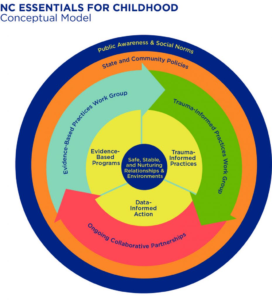

By Michelle Ries
The collective impact process—specifically the work of ensuring a common agenda and identifying mutually reinforcing activities—can often seem like it happens in fits and starts. It can sometimes feel difficult to maintain a sense of urgency, even around goals and outcomes that everyone agrees are worthwhile.
Thanks to our work on as the Essentials for Childhood backbone organization, however, we now recognize that continuous communication is paramount to moving the work forward. North Carolina’s Essentials for Childhood partners have learned that monitoring and communicating about the vast body of work being done across the state to ensure child and family well-being, identifying appropriate areas of collaboration, partnering on activities to meet common goals, and building on each others’ work, are key to ensuring that our state’s children are growing up in safe, stable, and nurturing relationships and environments.
In 2014, the North Carolina Institute of Medicine, in partnership with the North Carolina Department of Health and Human Services (NC DHHS) Division of Public Health (DPH), convened the Essentials task force in an effort to develop a collaborative, evidence-based, public health initiative to address child maltreatment prevention and family well-being in North Carolina.
Many public, private, and philanthropic organizations work independently to meet the physical health, mental health, social, and emotional needs of children and families in North Carolina. While the programs developed by these organizations provide much-needed services and supports, they sometimes focus on very narrow and specific needs of young children and their families (i.e. small service array and restricted eligibility). Programs and services often exist in silos, and separate children’s physical, cognitive, and social-emotional development, or carve out even smaller distinctions rather than treating children’s development components and family needs as integrated and interdependent.
The Essentials task force recognized the need for enhanced cross-sector collaboration and came to the conclusion that a collective and integrated initiative would be the best way to create more effective partnerships and improve North Carolina’s capacity to prevent child maltreatment and ensure safe, stable, and nurturing relationships and environments.

The Task Force on Essentials for Childhood recommendations led to the establishment of a multi-year, cross-sector collective impact initiative focused on building partnerships and aligning goals. Since 2016, the North Carolina Institute of Medicine has served as the Backbone Organization to support the implementation of these recommendations.
Our state currently has a unique opportunity for successful alignment of the Essentials for Childhood goals with other statewide and local initiatives. NCDHHS is undertaking a significant strategic focus on early childhood (the Early Childhood Action Plan), through which NCDHHS will align work and programs across divisions to ensure optimum health and well-being for our state’s children. NCDHHS outlines the Early Childhood Action Plan in three categories: safety, health, and development and education. In these categories, NCDHHS will use the Essentials for Childhood recommendations as its priority strategies to meet 2025 outcomes including: decreased rate of child abuse and neglect and infant mortality, increased social-emotional well-being and resilience in young children, and an increase in the percentage of: children in foster care who obtain family permanency, infants born at healthy birth weight, young children with food security, children with language skills on track, children who enter kindergarten developmentally on track, and children achieving 3rd grade reading proficiency.
Further aligning with Essentials work, these outcomes are also a subset of the benchmark indicators identified in a statewide stakeholder initiative, Pathways to Grade-Level Reading, held in partnership with Essentials for Childhood as part of the data development recommendations identified by the Task Force.
We look forward to continuing our work with partners to identify next steps and refine priorities for implementation of the Task Force recommendations, and collectively ensuring safe, stable, and nurturing relationships and environments for all kids in North Carolina.